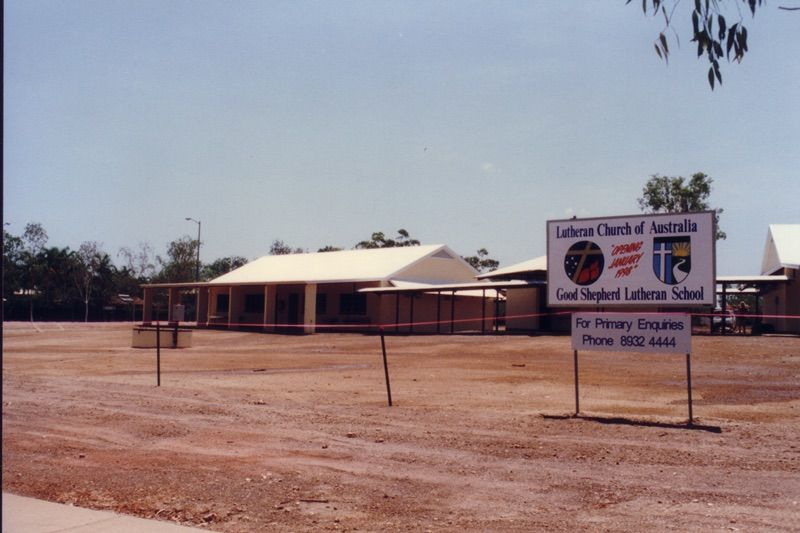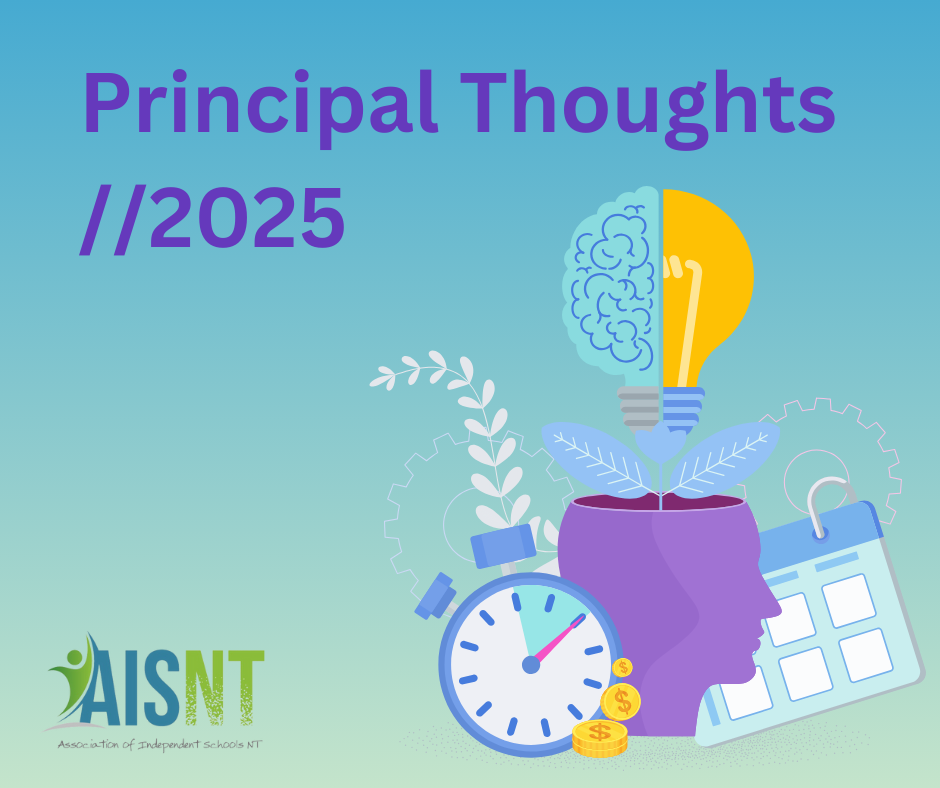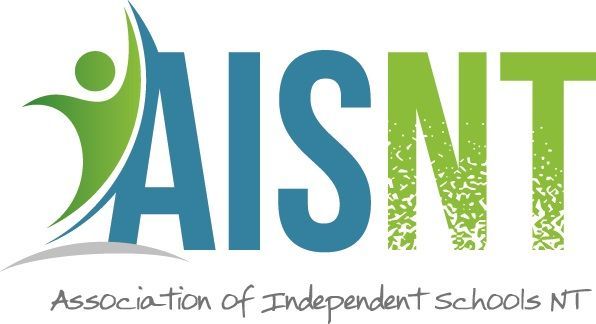Where Do I Start?
This is a question I often ask when I sit down to write my weekly Principal Thoughts. The questions buzz around - what might be important; what might be valuable; what might be helpful; what might be thought provoking? These are all questions a Principal might ask before talking with their staff. This morning I was set on an approach when I had a conversation with my brother, who is a very experienced and capable educator and as a result another variety of approaches were sown in my mind. This was highly stimulating but of course needed sorting. A principal may be a good administrator who will be appreciated. However they will also need to be a creative and inquisitive thinker. As we all know, in a school there is no shortage of stimuli for this activity.
HOW CAN SCHOOLS BE VALUABLE?
On the weekend I had breakfast with a former student and his wife. I last taught him in 1985 which is a little while ago. I was keen to see him and hear how life had treated him over those 38 years. Yes he had made a real go of it, set up businesses, worked hard and made a success of his life. He and his family eventually moved from Country Victoria to the Pilbara where they started a new life with their three young children all of whom eventually went to University after they had left school. The isolation of a mining town in a remote area had not been detrimental to them and, as we know in the Territory, it can also be an advantage. When my children went to Uni they had the experience of knowing that coming from Alice Springs other students were usually interested in them. If they had said they had come from Melbourne there would be likely that look of “Oh yea, whatever”.
I asked the former student the question of what was the most valuable aspect of his education. Without hesitation he said it was that it gave him confidence to tackle challenges, including new challenges and welded into him a belief that he could make things happen.
Consequently he tackled a variety of businesses, employed people and learnt what he didn’t know. He undertook SES type community work, including becoming proficient in mine rescue. He had the confidence to change direction when he felt it was right to do so. He said the most valuable part of his education was Outdoor Ed. He threw himself into Outdoor Ed and in his own way was not only an enthusiast but became a leader. Outdoor Ed gave him heaps of new experiences which demanded real courage to master - bushwalking, camping, navigation, rock climbing in the Grampians (big one!), abseiling, canoeing, bush rescue etc. He was a key person who embraced enthusiastically all activities and was always the first to volunteer when there was a need.
Confidence building in students is a key responsibility for any school which goes with a real understanding of each student and not just the ones that are easy to relate to. It is a joy for any good teacher to see confidence building in their charges. Real experiential learning is a good vehicle to do this. When talking to former students I’m always affirmed by the number who remember their experiential learning as very effective times in their education. Kurt Hahn, an enthusiastic exponent of experiential learning, emphasized the value of real, rather than token experiences. Outward Bound and The Duke of Edinbugh Award Scheme, both of which he founded, still exist Worldwide today and are extremely successful at making a difference to the lives of young people.
THE IMPACT OF MUSIC IN LIFE
At a recent test I was having, the medico running it said that he was retiring soon and aimed to take up learning the piano. He was going to do this because he had always wanted to and also because he knew of the positive effect learning a musical instrument had on the brain, something to consider particularly in the ageing brain. I’m really impressed with the Steiner School philosophy which makes learning a musical instrument important and a priority. With this in mind I searched the internet to see what I could find out about music and the brain. Research from the Harvard Medical School concluded that “Music activates just about all of the brain.”
The article I read says “Music has been shown to activate some of the broadest and most diverse networks of the brain. Of course, music activates the auditory cortex…………Music also activates a variety of memory regions. And interestingly, music activates the motor system.”
Furthermore the article goes on to say, “Brain pathways - and even whole networks - are strengthened when they are used and are weakened when they are not”. With music they are being used. This is a very small glimpse of a most complicated topic but it is enough to convince me to keep playing music each morning and I would like to think students everywhere could do the same, but it needs to be presented in a constructive, creative and enjoyable way. Maybe the days of learning the recorder were more valuable than we thought at the time. Happily I know that many schools make music a priority.
PERSISTENCE
For some reason I became interested in the word Persistent. I enjoy words and their origins and am always fascinated at how their meaning can “balloon out”, sometimes accurately but other times spuriously. I managed four years Latin when I was in secondary school and was informed that it would be needed if I was to be a lawyer or doctor. Well I became neither and that requirement did die out anyway. Though I didn’t enjoy Latin it has generated moments of interest throughout my life. However, rather than enjoyment I did require a fair amount of persistence to get through year 10 Latin. Take the root of the word “Persist”. It is derived from the Latin verb “persistere”. This means to continue steadfastly or to hold to a course of action. It has been immortalised by many interesting and useful quotes:
Aristotle - “We are what we repeatedly do. Excellence is not an act but a habit.”
J.K.Rowling - “Rock bottom became the solid foundation in which I rebuilt my life.”
Benjamin Franklin - “Energy and persistence conquers all things”.
Marie Curie - “life is not easy for any of us. But what of that? We must have perseverance and above all confidence in ourselves. We must believe we are gifted for something, and that this thing must be attained.”
Winston Churchill - “Success is stumbling from failure to failure with no loss of enthusiasm.” Churchill, great leader that he was, had no shortage of failures.
Mother Teresa- “Be faithful in small things because it is in them that your strength lies.”
Albert Einstein - “It’s not that I’m so smart, it’s just that I stay with problems longer.”
Cathy Freeman - “You’ve got to try and reach for the stars or try and achieve the unreachable.”
Benjamin Disraeli - “Through perseverance many people win success out of what seemed certain failure”.
Oprah Winfrey - “Turn your wounds into wisdom.”
In AISNT there are so many wonderful examples of triumph through Persistence by Principals as they develop new schools in challenging areas or deal with the many difficult social issues faced today. Or indeed as they tackle the problems of staffing in a remote area including finding the right principal willing to tackle some unique challenges. I think we do have a group of very special Principals..
With our students it is valuable to use the language of Persistence regularly so it becomes one of the key understandings of what a school stands for, and steadily it will become a belief amongst the school population - however it probably already is in most schools. My favourite with students was to have them say, “I can make it happen.”
The Latin verb “persistere” is made up of two components: “per” which translates as “ through” or “by means of.” “sistere” which means to stand. Using the Latin can be done as a bit of fun, but nevertheless making a salient point.
I enjoy using the Latin sentence “Id est Quod id est” which means “It is what it is.” Using the Latin is eccentric but you may get a “what did you say?” Then there is a good chance the people you are speaking to may remember the translation and perhaps think further about it.
Being a Principal is like being a quality diamond which has been cut with so many facets that all have to shine. Sometimes I also felt it was like being a Rubik’s Cube!
Written by Chris Tudor



